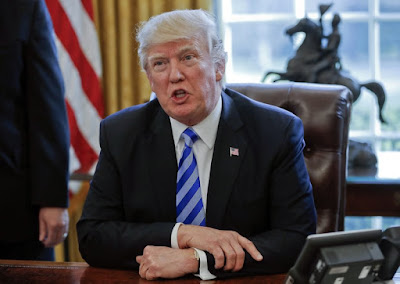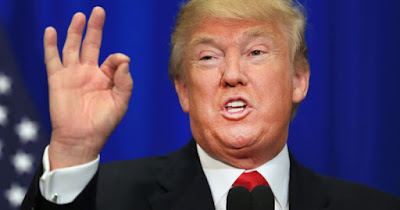Donald Trump, Edward the Confessor and 'Telephone Diplomacy'
History is littered with great rivals: Ali V Frazier, Rommel
V Montgomery, the ‘Compare the Market Meerkat’ and the ‘Go Compare Singer’.
This week we saw the re-emergence of another one on the international stage.
Now correct me if I am wrong, but Donald Trump strikes me as a man with several enemies. However, on Tuesday his greatest foe once again appeared in the oval
office: the telephone.
 |
| The weigh in: Some say the rivalry is faked for the media, and that Telephone is just using Trump as a stepping stone to get a fight with Anthony Joshua |
If you haven’t seen the painfully awkward phone call Trump
had with the Mexican President on Tuesday, I thoroughly recommend watching it
now (Link here: https://www.theguardian.com/us-news/video/2018/aug/28/enrique-hello-trumps-awkward-phone-call-with-mexican-president-video). To summarise, Trump attempted to call President Enrique Pena Nieto in order
to discuss their new trade deal. However, things quickly went south. In a scene
reminiscent of The Thick of It, Trump began speaking on the phone only to
discover Nieto wasn’t on the line at all. After a few awkward minutes waiting, one
of Trump’s aids finally managed to figure out how phones work and patched the
Mexican President through. Their conversation wasn’t much better, with Trump
proudly declaring he’d call the trade agreement between the United States and
Mexico ‘the United States-Mexico trade agreement’ on the grounds that it is ‘an
elegant name’. Likewise, he persistently slagged Canada off, clearly sending
the message to Canadian Prime Minister Justin Trudeau that he’s not allowed in
the ‘United States-Mexico trade agreement clubhouse’
 |
| I’m genna start my own trade agreement, with blackjack and hookers. In fact, forget the trade agreement! |
It’s not the first time phone calls have caused problems for
Trump. Upon election he got in trouble for speaking to the Taiwanese President
on the phone, ignoring the fact that the US cut formal diplomatic relations
with Taiwan 40 years ago. Interestingly this week's incident wasn’t even Trump’s first bad
phone call with the Mexican President. Back in 2017, he told President Nieto that
Mexico ‘had not done a good job’ in regards to its ‘bad hombres’, before
supposedly threatening to send US troops into Mexico.
 |
| Donald Trump- a man so out of date he struggles with a piece of technology invented in 1876 |
Despite the potential for cock-ups, the telephone is
undoubtedly a key tool in the modern head of state’s diplomatic toolbox.
Crucially, it allows a leader to respond quickly to a changing situation. This
is frequently demonstrated following elections. In the aftermath of a new
president or prime minister being elected, it is common for them to have
telephone conversations with foreign leaders. To return to Trump, following his
election in November 2016, he quickly spoke to the leaders of Egypt, Ireland,
Mexico, Israel, Turkey, India, Japan, South Korea and the UK.
 |
| Ninth on the President's 'to speak to list' apparently |
The purpose here is twofold. Firstly, the phone call serves
as international recognition of the leadership change. Secondly, it creates a
working relationship between the leaders, which will in turn help maintain/improve their respective countries’ relationship.
Medieval kings faced similar foreign policy issues to modern
presidents. Whilst there weren’t elections, kings were frequently replaced
thanks to plagues, rebellions and invasions. Although, unlike their modern
counterparts, medieval leaders did not have phones to help them quickly respond
to these changes
 |
| Nor skype, nor snapchat, nor even the internet (that’s right- not even that ‘E’ internet you get on your phone sometimes) |
Nevertheless, medieval rulers did develop strategies for
establishing relationships with new kings, as Vita Ædward Regis’ account of King Edward the Confessor of
England’s succession (1042) demonstrates. This eleventh century event provoked
a series of diplomatic responses. Firstly, Henry III of Germany, ‘delighted to
learn that Edward had been enthroned in his ancestral seat, dispatched
ambassadors to confirm their amity’. These ambassadors brought with them gifts,
which Henry III hoped would contribute to ‘peace and friendship’ between the
monarchs. Next, Henry I of France and Sweyn of Denmark also sent ambassadors to
Edward. The English King then responded: ‘to each of these according to his
rank were sent from the king royal gifts’.
These practices served the same function as a new president
taking a phone call from another head of the state. From a functional point of
view, sending envoys with gifts is far quicker and easier than arranging a
bilateral summit (for the king at least). However, it still had a big symbolic
impact. The arrival of foreign
ambassadors at his court clearly showed that Edward was recognised by the other
kings as the English monarch. The gifts he received would have further
contributed to the acknowledgement, as they became the physical embodiment of
the recognition. Consequently, Edward could display these at court
indefinitely, reminding witnesses that he had been recognised as king by Henry
III and co. Moreover, these envoys were an overture by the foreign kings to
establish a relationship with Edward. By sending gifts back Edward was not only
thanking them for the acknowledgement, but also confirmed he accepted their
offers of ‘peace and friendship’.
It’s not hard to determine the political aims and
ramifications of these diplomatic missions (though to do this I’m genna have to
look at genealogy and family trees a bit- bear with me). Edward succeeded in
1042 as the son of King Æthelred the Unready, who reigned from 978 to 1016. As any
student of numbers will tell you, there is a gap between 1016 and 1042. During
this 26 year period England was dominated by a different ruling family. In
1016, the Danish King Cnut the Great (of non-tide-turning fame) defeated Æthelred’s
elder son Edmund and became King of England. Meanwhile Æthelred’s other
children went into exile in Europe. Following his death Cnut was succeeded by
his sons: first Harold Harefoot (who carried a hare’s foot around with him
every day for luck), and then Harthacnut (who was literally half the size of
Cnut)
 |
| Ok, so maybe those aren’t the true etymological meanings behind their names, but I am pretty certain neither Harold nor Harthacnut are genna come after me for libel. |
However, when Harthacnut died without an heir the English
nobility decided to put Edward on the throne. Thus, Edward became king less
because of anything he’d done and more because he was last man standing in a
pretty intense game of musical chairs. Combined with the fact he’d spent most of
his life outside of England as an exile, it seems likely Edward would have had
a legitimacy problem. Therefore, returning to the ambassadors who visited
Edward upon his succession, this new and untested king would certainly have
been grateful to receive international recognition from several other high
status rulers.
On the other hand the kings who sent the ambassadors and
gifts would’ve benefited too. Geopolitically speaking, England was in France,
Germany and Denmark’s neighbourhood, making it sound political strategy to
establish a relationship with England’s new king. Dig a little deeper though,
and we find more specific reasons for getting on good terms with Edward. Let’s
take Henry III of Germany for example. In 1036 he married Gunhilda, daughter of
King Cnut and full sister of Harthacnut. This gave him a relationship with the
ruling dynasty of England at the time, a connection he would not have wanted
Edward’s rise to undermine. By sending
an ambassador, Henry III showed that although the leadership had changed he
wanted to maintain a good Anglo-German relationship. This closely mirrors
Theresa May’s reasons for speaking to Trump on the phone after his electoral
victory. Though the man in charged had changed, May wanted to ensure the
Anglo-American special relationship was upheld.
As these examples show, whilst the technology of diplomacy
has evolved over the years, the aims and outcomes have often remained relatively
constant. This is good news for Trump, who could employ some of these bygone
tactics next time he conducts diplomacy with another head of state.
 |
| ‘How long have we got left on my Amazon Prime trial? Let’s get two copies of ‘The Art of the Deal’ down to Mexico ASAP. That'll do for a gift right?’ |
Anglo-Saxon Chronicle, in English Historical Documents: c. 500-1042, ed. by Dorothy Whitelock (London: Eyre & Spottiswoode, 1955), pp. 135- 235.
Anglo-Saxon Chronicle, in English Historical Documents: c. 1042-1189, eds. by David C. Douglas and George W. Greenaway (London: Eyre & Spottiswoode, 1953), pp. 107-203.
'Donald Trump tells Theresa May: UK is special place', BBC, 10 November 2016: https://www.bbc.co.uk/news/uk-politics-37941737 . Accessed 29 August 2018.
The Life of King Edward who rests at Westminster, ed. and trans. by Frank Barlow (Oxford: Clarendon Press, 1992).
'Trump-Taiwan call breaks US policy stance', BBC, 3 December 2016: https://www.bbc.co.uk/news/world-us-canada-38191711 . Accessed 30 August 2018.
Zurcher, Anthony, 'Trump's telephone un-diplomacy', BBC, 2 February 2017: https://www.bbc.co.uk/news/world-us-canada-38849257 . Accessed 29 August 2018.



Comments
Post a Comment